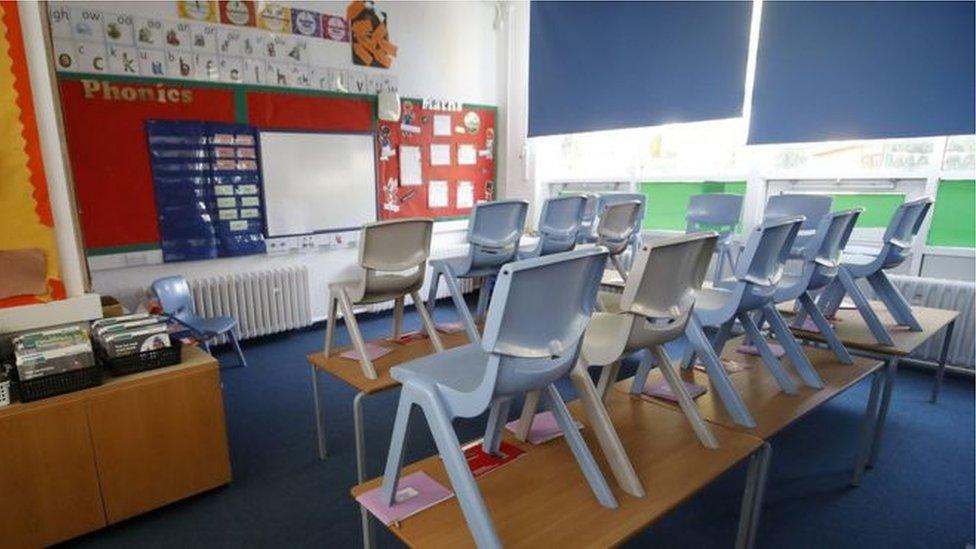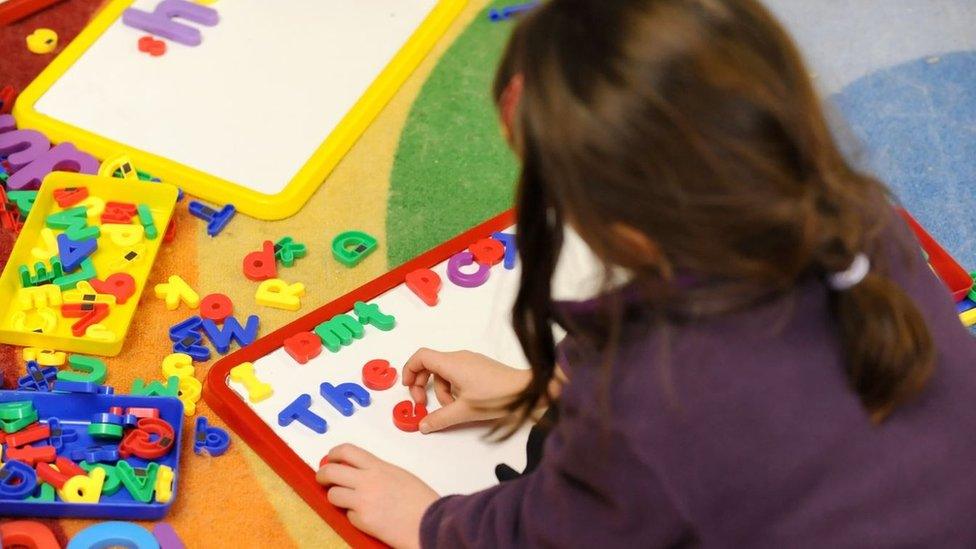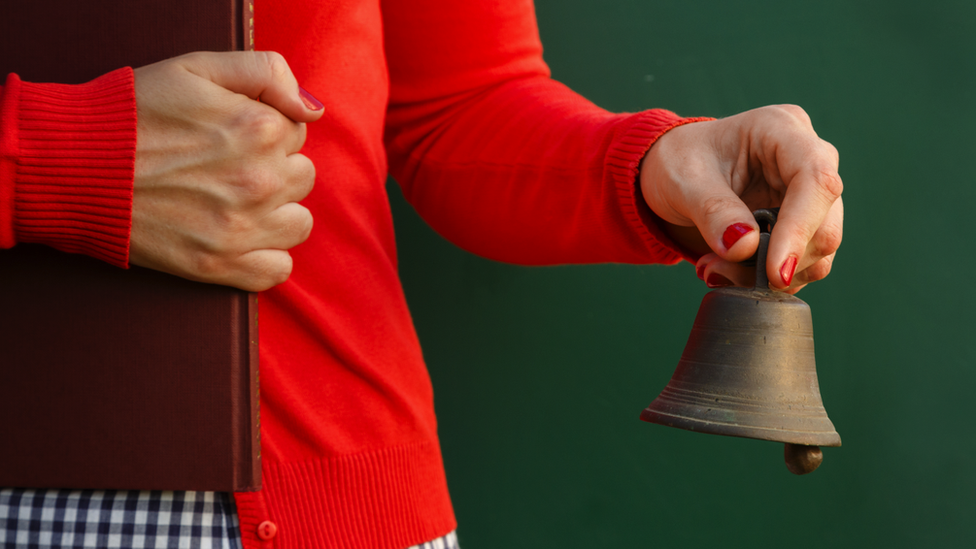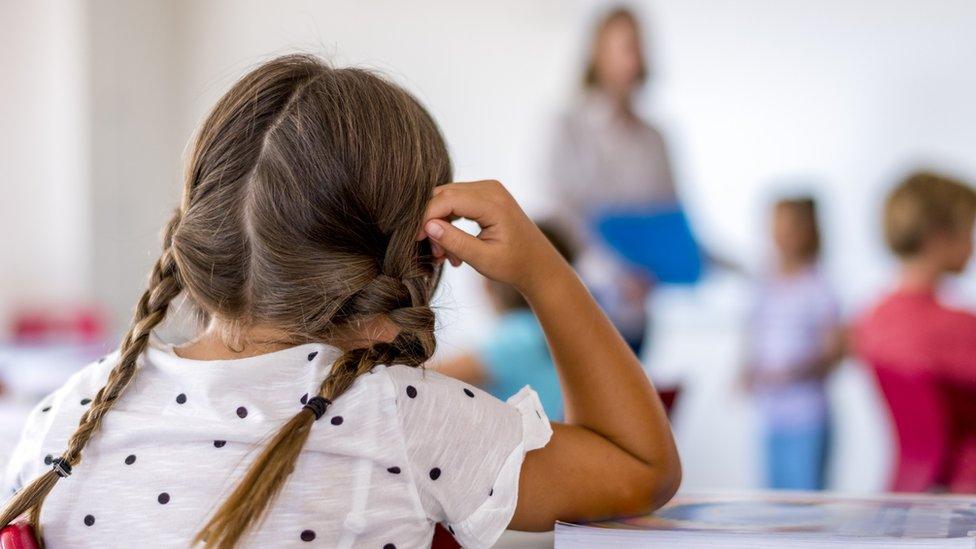Coronavirus: Special school pupils to return from 24 August
- Published

More than 6,000 pupils with a range of special educational needs (SEN) attend 39 special schools across NI
Some pupils can return to special schools in Northern Ireland from 24 August.
That is according to guidance from the Department of Education.
However, many pupils may only be able to attend part-time initially and the number of therapies available to them could be reduced.
Pupils will also likely face staggered start and end times to the school day and many of the measures previously recommended for mainstream schools.
Small group class "bubbles" to limit pupils mixing are also likely to be used, although they will be expected to maintain 1m social distancing.
However, special school leaders will have to make many of the decisions about how their individual school will operate.
More than 6,000 pupils with a range of special educational needs (SEN) attend 39 special schools across Northern Ireland.
The majority have been closed to pupils since mid-March and the department has published guidance on how they will reopen after the summer break.
It acknowledges there are particularly complex concerns for special schools around safety, support for pupils and staff-to-pupil ratios.
If necessary a risk assessment of an individual child's needs will be carried out to establish if it is safe for them to return to their school.
'Pupils shouldn't wear PPE'
The guidance said pupils may not be able to receive all of the in-school therapies and services they previously received.
"Planning is under way within the Public Health Agency (PHA) to deliver the necessary services to special schools such as nursing, speech and language, physiotherapy and occupational therapy for school restart," the Department of Education guidance said.
"It should be noted, initially, that the full range of service provision may not be offered as set out in an individual's statement of SEN but will be delivered on a best endeavour duty.
"It is important that parents and carers understand that the full service provision as detailed in their child's statement of SEN may not be met at this time."
The guidance also said pupils should not wear personal protective equipment (PPE).
However school staff may need to wear it for some tasks.
School meals
Principals have also been asked to decide if they need a school meal service, as how they timetable pupils may mean lunch in school will not be required.
"For meals that are brought into the school, the containers will be sanitised before being given to children," the guidance said.
"Depending on the timetable schools may judge that lunch does not need to be provided.
"Learners may bring their own lunches to school to minimise the risk of transmission."

There could also be phased returns for individuals or groups of pupils
The guidance said maximum face-to-face teaching time for all pupils was the aim, but it may not be possible to bring all children back to school straight away.
As a result, it said schools might prioritise some pupils to return first.
These could include those entering their final year of school, or about to transfer to another school, "particularly where multi-agency work to secure that progression is needed".
Pupils for whom school is crucial in getting access to vital services or therapies could also be prioritised.
Transport issue
However, the department said many schools may have to initially operate part-time timetables and attendance rotas, and reduce the health therapies or support provided.
There could also be phased returns for individuals or groups of pupils, which means schools will have to decide which pupils to bring back first and how often they can attend.
That is likely to mean some pupils will only attend school two days a week or on alternate weeks, a position also likely to apply in many mainstream schools in the new term unless wider public health guidelines change.
The department's guidance said transport was likely to be a particular problem as many pupils are brought to special schools in a bus or taxi.
"Transport to and from special schools will be challenging due to different start/finishing times, types of transport used i.e. shared buses or taxis and the social distancing requirements," the guidance said.
"Guidance on transport to and from a special school for the new academic year is currently being developed."
- Published24 June 2020

- Published19 June 2020

- Published4 March 2020
